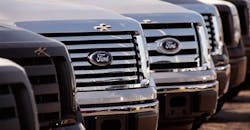Ford Sales Drop More Than Projected a Year After Harvey Rebound
It was a humbling month for Ford Motor Co.
As sales tumbled for the F-Series pickup, the second-largest U.S. automaker suffered the indignity of being outsold by Fiat Chrysler Automobiles NV for the first time in a decade.
Ford’s U.S. sales chief Mark LaNeve blamed the bad month for the company and the industry on “a tale of two hurricanes” -- recovery from last year’s Hurricane Harvey inflated sales a year ago while fallout from Hurricane Florence deflated sales in the Carolinas last month.
But the results are also a tale of two companies -- Fiat Chrysler with a fresh lineup of Jeeps, a restyled Ram truck and stalwart minivans in contrast to Ford with aging sport utility vehicles, collapsing car sales and its king-of-the-road F-Series suddenly finding itself the oldest pickup on the market.
“We don’t worry about being in a contest with them,” LaNeve, said of Fiat Chrysler. “You know, there’s been months when we beat General Motors and we didn’t pound our chests when that happened. It was a function of timing and what have you.”
Ford is counting on the cavalry arriving next year when it rolls out redesigned versions of its top-selling SUVs, the Escape and Explorer. And in 2020, Ford will bring back the brawny Bronco to try to take on the red-hot Jeep Wrangler. By then, Ford says it will have the freshest lineup in the U.S., even as it sheds sedans and exits the traditional car business. It’s all part of an $11 billion overhaul engineered by CEO Jim Hackett.
But September’s sales slowdown shows that Ford will launch all those new models into a market hitting the skids. A parade of automakers disappointed with worse-than-expected sales, including Toyota Motor Corp., which topped both Ford and Fiat Chrysler, as expected, and Honda Motor Co. GM, which reports only on a quarterly basis, said its sales fell 11 percent over the last three months, with all four of its U.S. brands heading south. And that can’t all be blamed on hurricanes.
“It’s a very hard comparison with last year,” said Michelle Krebs, a senior analyst with researcher AutoTrader. “But we do see headwinds building, with higher interest rates being the major one.”
And it is likely to get worse from here, as the auto market cools and inflation heats up.
“We anticipated the last part of the year would be challenging and now we’re seeing that,” Krebs said. “Wages aren’t rising fast enough to keep up with inflation and that is keeping some people out of the market.”
At least a couple of automakers beat expectations in September. Nissan Motor Co.’s decline was steep, but not as sharp as the 20 percent plunge analysts had projected.
And Fiat Chrysler, on a surge in Dodge Grand Caravans and Jeeps, managed to top Ford in light vehicle sales 199,819 to 196,496. The last time that happened George W. Bush was in the White House and Fiat Chrysler hadn’t even been created yet. Chrysler LLC, then owned by a hedge fund, outsold Ford in January 2007.
Ford’s F-Series pickups, the top-selling vehicle line in the U.S., ended a 16-month streak of sales gains, as the trucks experienced an 8.8 percent decline in deliveries. Ford’s aging SUV lineup also sagged 2.7 percent, with the Escape, the automaker’s second-best selling vehicle, plunging 20 percent. And the sedan collapse continued for Ford, with sales of cars dropping 26 percent.
Veteran auto analyst Maryann Keller sees reasons for the contrasting fortunes of Ford and Fiat Chrysler that go beyond hurricanes and economic headwinds.
“This speaks to the operational chaos at Ford,” Keller said. “You’re looking at two companies. One that has been well managed -- for whatever we like to think about” late-Fiat Chrysler CEO Sergio Marchionne “he had the focus in the right place -- product and current sales and market share and brand development. At Ford, the stock price is telling you what you need to know. There’s very little confidence in this management.”
Most major automakers are expected to post declines from a year earlier, when many people in Houston, the country’s fourth-largest city, boosted sales by replacing vehicles ruined by Hurricane Harvey.
The average analyst estimate was for industrywide deliveries to run at an annualized pace, adjusted for seasonal trends, of 17 million in September, down more than 1 million from a year ago. The pace appeared on track for 17.2 million, Jack Hollis, Toyota’s North America brand chief, said.
Earlier on Oct. 2, Tesla Inc. said it delivered 83,500 vehicles worldwide in the third quarter, doubling its total in the prior three months. Of those deliveries, 55,840 were Model 3 sedans, in the range of what Tesla forecast as it finally started to mass-manufacture the sedan. The Palo Alto, Calif.-based company doesn’t break out U.S. sales.
By Keith Naughton and Gabrielle Coppola
About the Author
Bloomberg
Licensed content from Bloomberg, copyright 2016.
